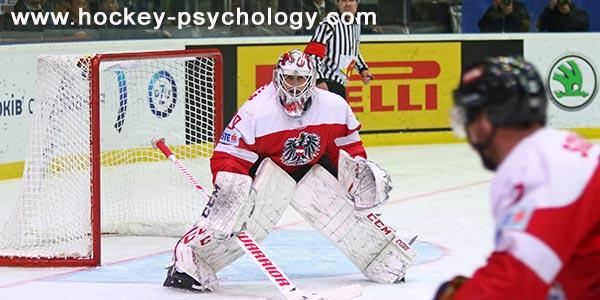
Learn How Hockey Goalies Adapt to The Pressure
All athletes experience pressure but just imagine the pressure experienced by a hockey goaltender.
Win and the offense normally receives the credit; lose and most of the blame rests with the goalie… at least, that is the perception of many hockey goaltenders.
This perception increases pressure and causes goaltenders to approach each game feeling they need to be perfect and shutout their opponent or else they might be the cause for the loss and let their teammates down.
Pressure can mount for a goaltender if they have difficulty moving forward after letting in a goal.
In our hockey survey, a goalie asked a question in the comment area regarding how to let go after letting in a goal:
“After giving up a goal, what is the proper mindset a goalie should have?”
First of all, you are experiencing a common sentiment among many goaltenders.
As a goalie, the spot light is on you and your play is under more scrutiny than the other players on the ice. You feel all eyes are on you and expectations are high.
You feel you need to stop every puck or you will be blamed by your teammates and coaches for losing. If you let in a bad goal, not only will you be blamed, but you will suffer overwhelming embarrassment.
The Expectations are High and Weigh Heavy on You
The pressure you put on yourself, the overwhelming expectations you place on yourself and the fear you feel cause you to play tight and slow down your reflexes in the crease.
Mistakes by other players are often overlooked. For example, a left winger has a clear shot that misses the goal by a couple of feet…
The puck caroms hard off the boards giving the opposing offense a 2-1 breakaway…
The defender picks up the wrong attacker giving the offense a clear shot on goal…
The attacker fakes you out and puts the puck in the net. Many mistakes were made by your team but you, being the last line of defense, feel you are the reason the opposing team scored.
Letting go can even be challenging for top NHL goaltenders.
Detroit Red Wings goaltender Jimmy Howard is an 11-year veteran who struggled through a 14-game losing streak during the 2019-20 season.
HOWARD: “I know I can do it. Sooner or later the hard work is going to pay off, I believe. I can’t over-analyze things. Quit thinking out there and use my hockey instincts. Confidence plays a big part of it for any player out there. Scorers not putting the puck in the net might be gripping the stick a little harder. For me, it’s not thinking and just playing the one puck out there.”
Trust is the major takeaway from Howard’s comments. Trust in your abilities and trust in your training requires that you immerse yourself in the moment and steer clear from over-analyzing your play during the game.
How to Respond to Giving Up a Goal
NHL goaltenders have over .900 save percentage. So that one goal that gets past you is often hard to overcome mentally.
Instead of focusing on the outcome, how was your attempt or approach to making the save? Were you focused, see the puck clearly, and in the right position to make the stop?
Next, dwelling on the fact that you allowed a goal leads to the “monkey on the back” syndrome: Your trying to focus on the next stop, but your mind is still stuck in the past.
A better mindset is to focus on the next chance to make a stop. The past is in the past and you can’t “make up” for the last goal. Remind yourself to move on and trust you team to score goals.
Related Articles on Hockey Mental Game:
- When Pushing Athletes to Excel Turns into Pressure
- Overcome Pressure Packed Expectations in Hockey
- Mental Keys to Recovery for Hockey Players
*Subscribe to The Sports Psychology Podcast on iTunes
*Subscribe to The Sports Psychology Podcast on Spotify
Mental Coaching Programs for Hockey
Our mental game coaching programs for hockey players helps athletes improve confidence, concentration, let go of errors quickly, and stay composed during crunch-time. Read more about sports psychology for hockey players at Peaksports.com
Please contact me by phone at 888-742-7225 or by filling out the webform below to learn more about our personal mental training programs for hockey players or teams:
Leave a Reply